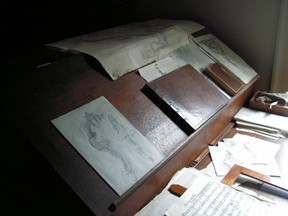[ 3 minutes to read ]

I’ve worked with woodcase pencils, plastic lead holders, and mechanical pencils. In my earlier days I preferred thin and sleek, but in my later days with gout, carpal tunnel, and such, I prefer a thick grip and enough heft that I don’t get hand cramps from using it. I’ve used various graphite and plastic leads and inks.
I’ve used technical pens for inking drawings, cheap Bic’s for everything from writing to firing spitwads. I’ve used a number of different fountain pens for, gasp, writing by hand. Good paper, a good pen, and good ink has a way of inspiring you to write something good.
Oh, what could be . . .
I haven’t done it for a long time, but I always loved taping down a fresh sheet of vellum, squaring up the drafting machine, considering what that sheet of paper would be in a few hours or a few days, depending on what needed drawn. I enjoyed taking a good mechanical pencil with downward pressure and a slight twist along a straightedge as most of the lead left a line and a little of it crumbled along the edge. No worries, a quick whisk with a horse hair brush and all was right.
I’ve been around the sun enough times to be able to reflect on some things that are past. Unfortunately, I’ve found many things have already slipped beyond recall. So while I love good paper, pens, and pencils, what I really love is the possibility that these bring. Some are intimidated by a blank page but it’s full of wonderful possibilities. These implements represent a great potential.
Potential: it’s what could be. The sky really is the limit. It could be anything, everything, or nothing. If you can imagine it, you can imagine it. I don’t think I’m alone. We love potential. We rejoice in it. We brag about it. We celebrate possibility more than reality. Not a few sheets have betrayed the vision of my mind and ended up in a crumpled ball and banked off the wall into a metal can.
If we think wisely about this, might the dreamy potential be hindering us from actually doing something? Solomon advises us wisely, “Better is the end of a thing than the beginning thereof” (Ecclesiastes 7:8). The beginning of a thing is the potential phase. It is the dreaming and planning phase where we are swept away with possibilities.
If we linger too long in the possibilities of what might be, we end up not knowing what is (Proverbs 14:23). The end of a thing is something. Something has been made, written, drawn, painted, produced. It has tangible existence and no longer abides only in the talk of the lips.
But what if what’s made is lesser than the dream imagined? The thought daunts us. We take solace in the vision because it’s perfect. It’s just the way we want. The reality is almost certain to disappoint. Yet here, if I may stretch Solomon’s meaning a little, “a living dog is better than a dead lion” (Ecclesiastes 9:4).
Oh, what might have been . . .
Solomon teaches us repeatedly that it is our portion in this life to enjoy the fruits of our labors (Ecclesiastes 3:22; 5:18-19; 9:9). Fruits of labor are the results of work, not the results of talk (Proverbs 14:23). To enjoy the fruit we have to do the work. So Solomon admonishes us, “Whatsoever thy hand findeth to do, do it with thy might; for there is no work, nor device, nor knowledge, nor wisdom, in the grave, whither thou goest” (Ecclesiastes 9:10).
Paper and ink and lead are called consumables, because they exist for that purpose. They are meant to be used up. The paper should be marked on. The pen should run dry and the pencil should end as a nub. They are serving their purpose that way. Our life is also consumable. It’s meant to be used up. Celebrating possibilities can keep you from celebrating realities, which is far better, and as with pen and paper there comes a time when it is too late.
The Blank Page https://t.co/0dxdmqD6Rp